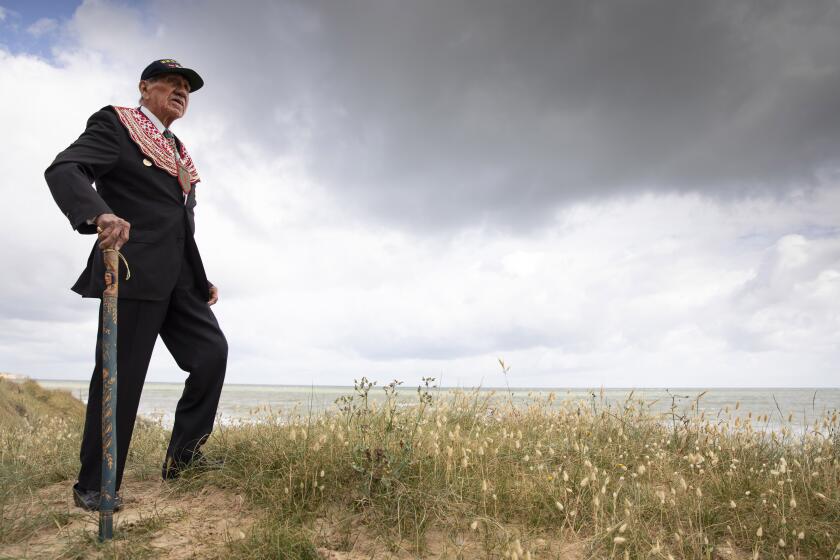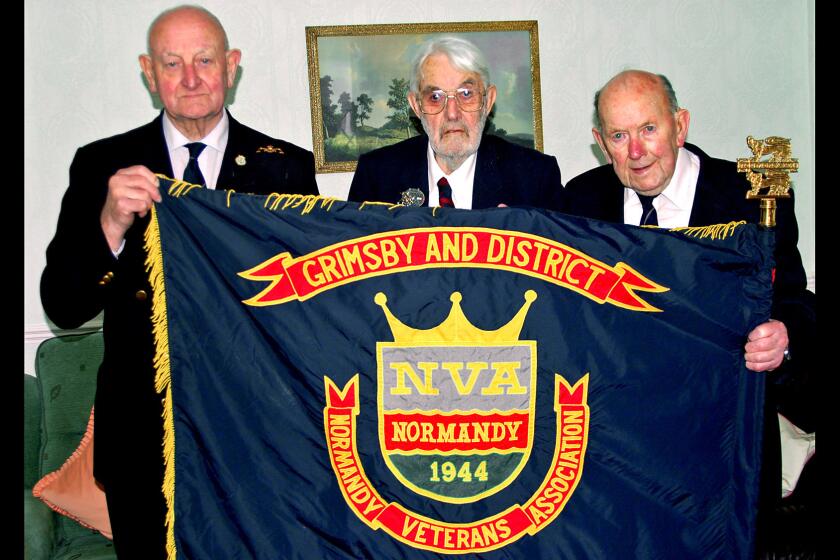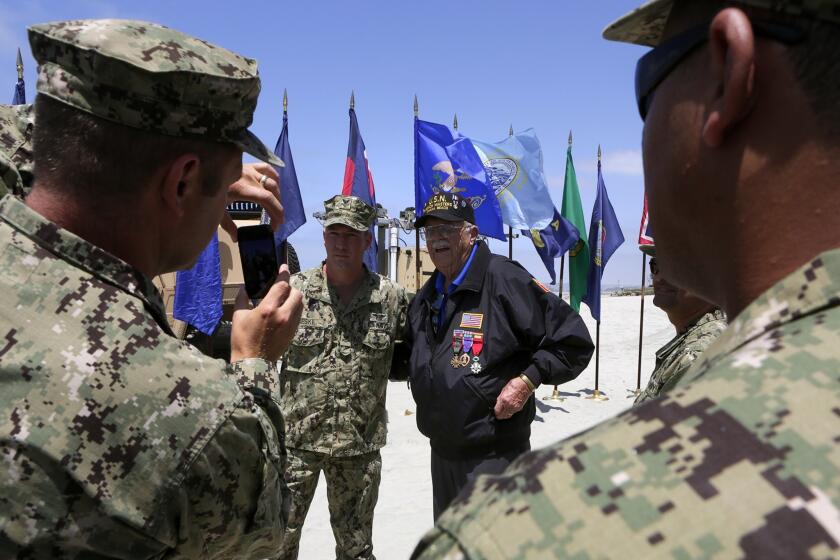Normandy honors World War II veterans on D-day’s 79th anniversary
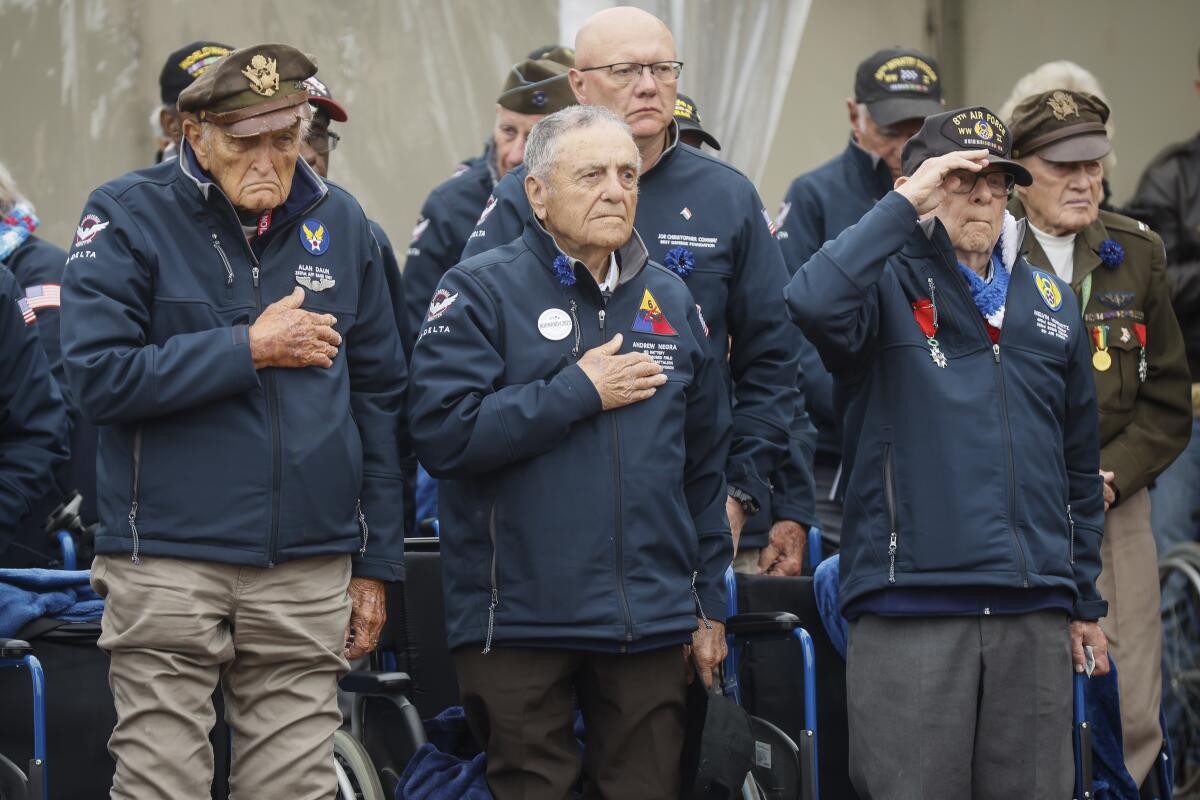
- Share via
ON OMAHA BEACH, France — An overwhelming sound of gunfire and men’s screams. That’s how World War II veteran Marie Scott described D-day, as Tuesday’s ceremonies got underway in honor of those who fought for freedom in the largest naval, air and land operation in history.
This year’s tribute to the young soldiers who died in Normandy also reminds veterans, officials and visitors of what Ukraine faces today.
On Tuesday, the whistling sound of the wind accompanied many re-enactors who came to Omaha Beach at dawn to mark the 79th anniversary of the assault that led to the liberation of France and Western Europe from Nazi control. Some brought bunches of flowers; others waved American flags.
Scott lived it all through her ears. She was just 17 when she was posted as a communication operator in Portsmouth, England. Her job was to pass on messages between men on the ground and U.S. Gen. Dwight D. Eisenhower and senior officers who were supervising the operation.
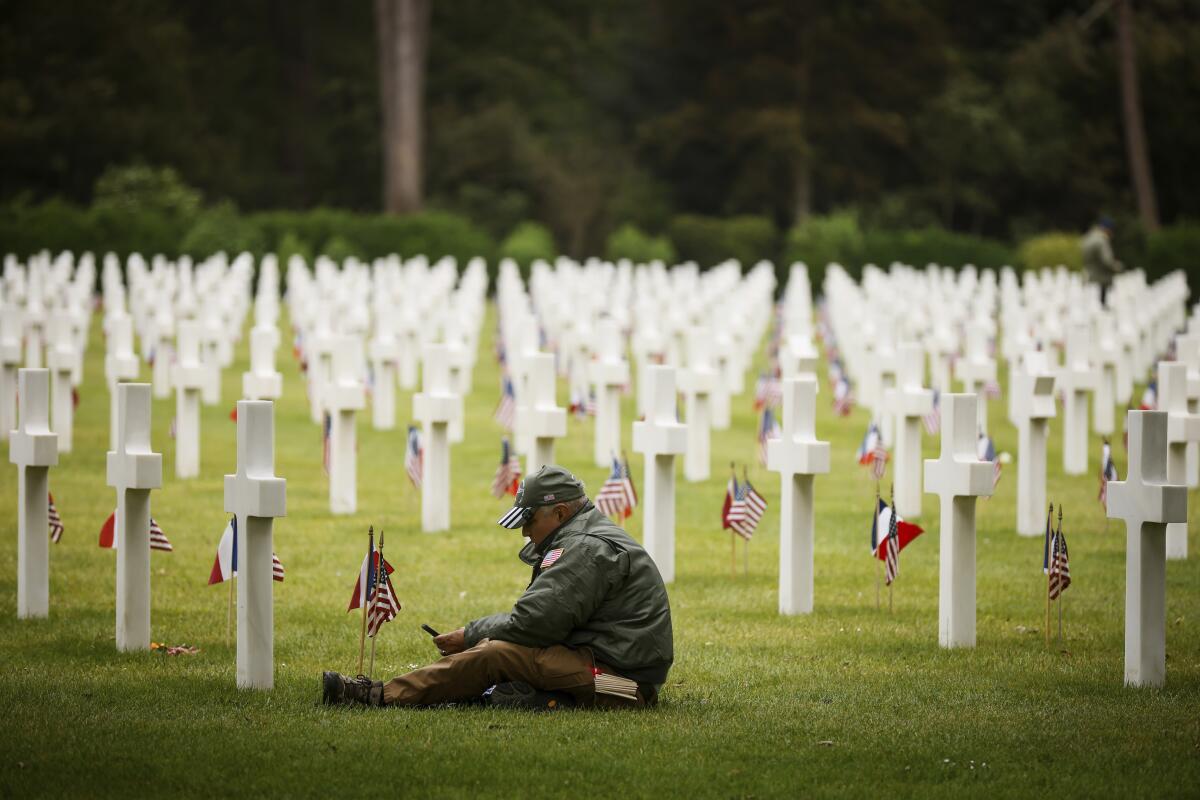
“I was in the war. I could hear gunfire, machine guns, bombing aircraft, men screaming, shouting, men giving orders,” she recalled.
“After a few moments of horror, I realized what was happening … and I thought, ‘Well, you know, there’s no time for horror. You’ve got a job to do, so get on with it.’ Which is what I did.”
Why is it called D-day? Decision Day? Doomsday? Dreadnought Day? None of the above.
Now about to turn 97, Scott said D-day was a “pivotal point” in her life.
“As a noncombatant, I was still in the war and I realized the enormity of war,” she said. “People were dying in that moment.”
Scott said she was “disgusted” that another war was now raging on the European continent following Russia’s invasion of Ukraine.
“For me, war should only be undertaken if it’s absolutely [necessary], if there’s no other way of solving the problem. It’s an atrocity. That’s how I feel,” she said.
This year’s anniversary observances for the June 6, 1944, D-day landings in Normandy will be one of the loneliest remembrances ever.
British veteran Mervyn Kersh, who landed on D-Day on Gold Beach, said Western allies should send maximum military aid to Ukraine: “The only way to stay free is to be strong.”
Kersh, 98, quipped: “I’m still in the reserve; I’m waiting to go to Ukraine now. Next job.”
On Tuesday, a ceremony took place at the American Cemetery in Colleville-sur-Mer, overlooking Omaha Beach, which is home to the graves of 9,386 U.S. soldiers, most of whom lost their lives in the D-day landings and ensuing operations. On the Walls of the Missing are inscribed 1,557 names. Some of those named have since been recovered and identified.
U.S. Defense Secretary Lloyd J. Austin III, speaking before more than 40 World War II veterans and a crowd of visitors, said that “it is our duty to defend ... the principles for which the Allies fought. ... We seek a world where civilians are safe from ravages of a war, [and] sovereignty and territorial integrity are respected.”
Some brothers you’re born with; others you choose.
He paid tribute to “brave young men and women from Ukraine who are learning how to fight for their lives and for their country. ... Today, I am more determined than ever to stand by them for as long as it takes.”
Joint Chiefs of Staff chairman Gen. Mark Milley also took part in the American Cemetery commemoration.
The Normandy celebrations were a chance for Milley to linger with troops who consider him one of their own as he winds down his own four-decade military career. The general held commands in both the 82nd Airborne Division and the 101st Airborne Division, and the Normandy fields, towns and causeways are these divisions’ hallowed ground.
“For me, being among soldiers is home,” he said. Milley begins his 44th year of military service Saturday. He is scheduled to retire at the end of September as his term as chairman ends.
Breaking News
Get breaking news, investigations, analysis and more signature journalism from the Los Angeles Times in your inbox.
You may occasionally receive promotional content from the Los Angeles Times.
Hundreds of current soldiers from both units were there, some on leave with beers in hand, others jumping out of aircraft as their predecessors did 79 years before.
This was Milley’s last Normandy visit as their top commander, and as he walked through Sainte-Mere-Eglise —known as the first town to be liberated from Nazi occupation — attended commemorative soccer games or spoke at ceremonies, it felt as though he stopped to talk and give a commemorative coin to every last one of them.
An international ceremony was scheduled for later at the nearby British Normandy Memorial in the presence of officials from Germany and the nine principal Allied nations: Belgium, Canada, Denmark, France, Britain, the Netherlands, Poland, Norway and the U.S. French Minister of Armed Forces Sebastien Lecornu and British Defense Secretary Ben Wallace were expected to attend.
In a separate event, French President Emmanuel Macron attended a ceremony Tuesday in the presence of 100-year-old Leon Gauthier, the last surviving member of the Kieffer commando — an elite French unit that was among the first waves of soldiers to land in Normandy.
Each year as the June date arrives, interest in the D-day landing of World War II waxes or wanes depending on its numerical significance.
Many visitors came to the American Cemetery ahead of Tuesday’s ceremonies to pay tribute to those who sacrificed their lives.
Jean-Philippe Bertrand, a visitor from the southern French city of Marseille, walked through the countless lines of white crosses Monday. “It’s unimaginable to make such a sacrifice for my freedom, for my son’s freedom,” he said.
“You hear about it on the news and you see the pictures. But once you’re here and you see the reality and the sacrifice that has been made for our beautiful country — I wanted to make the trip once in my life to thank all these people to whom we owe so much,” he added.
German professor Andreas Fuchs, who is teaching French in Berlin, brought students ages 10 to 12 to Normandy via an exchange program.
“It’s very important for children to have a moment in their lives to understand the liberation of Europe. And to know what peace has been for 80 years,” he said.
More to Read
Sign up for Essential California
The most important California stories and recommendations in your inbox every morning.
You may occasionally receive promotional content from the Los Angeles Times.
